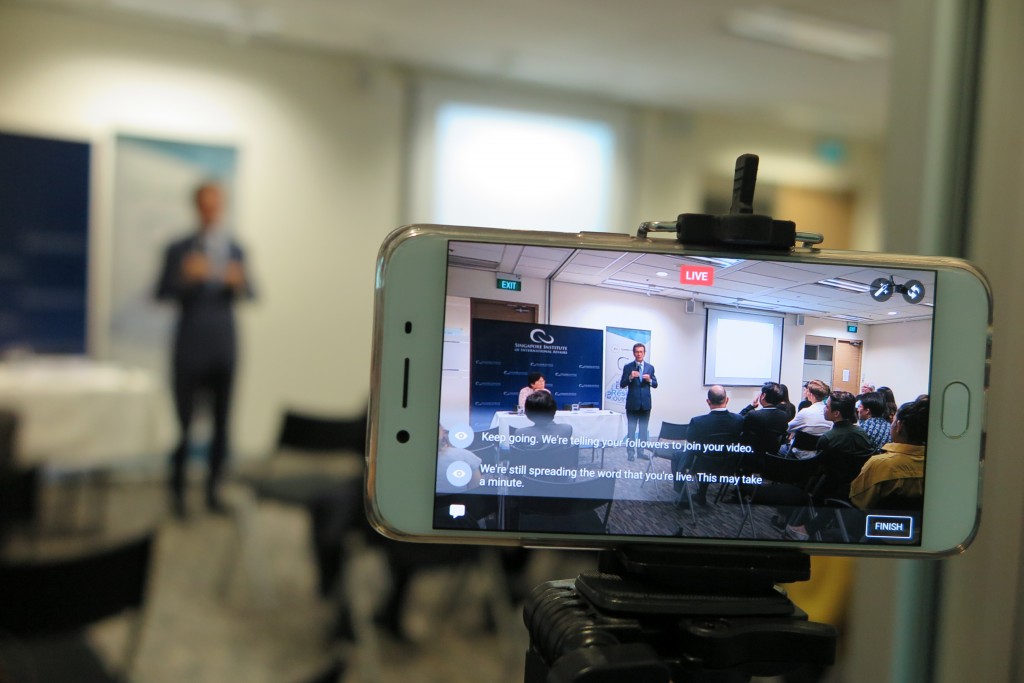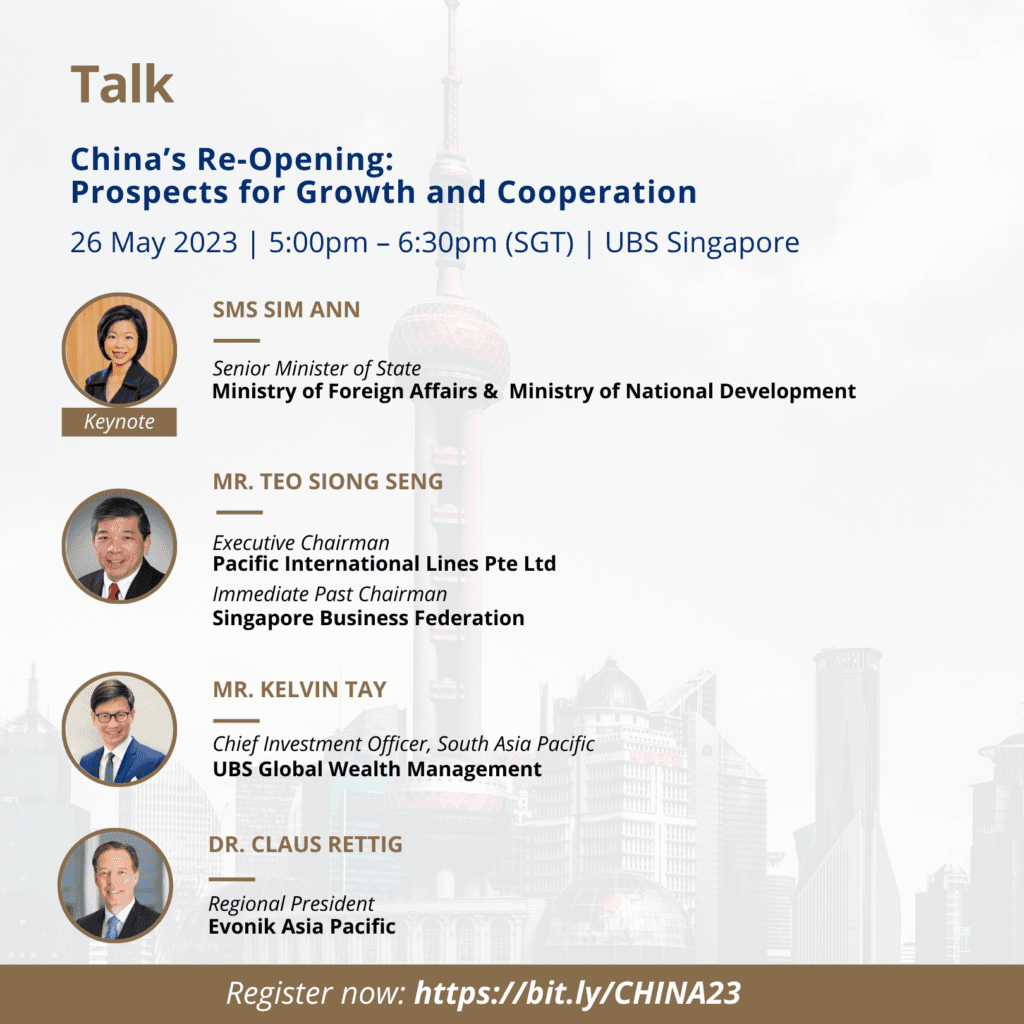This year will see major elections in the European Union’s largest member states, France and Germany. In the United States, US President Donald Trump has established a precedent of a populist outsider getting in to power. In this context, is the election of Ms Marine Le Pen in France still impossible? Could we see more upsets at the polls? To discuss this, we held an evening talk with the EU Centre in Singapore on 29 March 2017, posing this question to Mr Jonas Condomines, Former Head of the Asia, Australia & New Zealand Unit of the European Parliament. The session was moderated by Dr. Yeo Lay Hwee, Director of the EU Centre in Singapore, who is also a Council Member and Senior Fellow at the SIIA.
More photos from the event are available on our Facebook page.

Understanding Populism
“Populism is a simplified label,” stressed Mr Condomines. The term is useful for media reports, but it is broad and sweeping. It is often used by the establishment to criticise anything they do not like. Mr Trump is accused of being a populist, but arguably he simply had a good electoral strategy, merely a distasteful one for many people.
The Brexit referendum, the American elections, and other votes such as the recent election in the Netherlands are being viewed as part of the same spectrum, but each situation was very different. Mr Condomines noted the Brexit vote was unusual. The United Kingdom does not have much history with referendums, unlike other nations like Switzerland. In such cases, it is hard to say if citizens are truly casting their votes based on the specific issue at hand, or if they are treating it as a general expression of their dissatisfaction with the government.
In the US, the Electoral College system allowed Mr Trump to win the Presidency with very narrow margins in some states and without the popular vote. Compare this to the Dutch election, where there was never any danger of the far right taking over. The Netherlands has an extreme proportional democracy, and no party has managed to obtain an outright majority in parliament since the implementation of universal suffrage in 1919.

Likely Outcomes
“This idea (that) we are all in a mess is an oversimplification,” said Mr Condomines. In France, while Ms Marine Le Pen is polling strongly for the first round of the Presidential race, the French system requires a run-off between the top two candidates if nobody wins a majority in the first round. In a race between her and Emmanuel Macron, it remains likely support will coalesce around Mr Macron.
That said, Mr Condomines acknowledged that opinion polls are not precise, and France does have issues with voter turnout and a weak level of crystallisation of vote intentions, which is to say many people may change their minds.
In the case of Germany, the first vote to watch is the state election in Nordrhein-Westfalen, on 14 May. It is the most populous state in Germany and will give the best idea of what will happen in September. However, it is likely Germany will see a repeat of the current ruling coalition. The only uncertainty is who will lead the coalition, which may not be incumbent Chancellor Angela Merkel.
“I don’t see any populist threat to the stability of Germany,” Mr Condomines said.
Regardless of the results, France and Germany will take time to form new governments. In practical terms, we will not see any governments take the reins in either country this year. 2017 will thus be a year of introspection for the European Union.
Original Event Synopsis:
If the outcome of the UK referendum vote for Brexit and the election of Trump were sadly the defining moments in 2016, what would be the events to watch in 2017? The elections in France? The elections in Germany?
With the election of Trump, the possibility of Marine Le Pen being elected president of France is no longer impossible. While polls (if you still believe in them) show that Marine Le Pen will not break the proverbial 50% ceiling in the second round of the presidential election, and that democratic and liberal forces will probably coalesce behind Emmanuel Macron, the centre left candidate, nothing can be taken for granted.
There are observers in Europe who believed that populism and euroskepticism have reached its peak, and that there are signs that they are losing steam. Polls (again) for instance have shown that support for the European Union have gone up after Brexit, and that a pro-European politician, former president of the European Parliament, Martin Schultz who is running against Angela Merkel has been gaining support. The German elections in September will be closely watched.
This evening dialogue, co-hosted by the EU Centre in Singapore, features views from Mr Jonas Condomines who has worked for years on the interaction between public opinion and politics in a multinational and multicultural environment, both in academia and think tanks for his talk on the upcoming elections in France and Germany. His talk will attempt to clarify the issues, assess the reality and size of the challenges brought about by populist parties and politicians and offer some perspectives on what can be expected.
Event Details
Date: Wednesday, 29th March 2017
Time: 5:30pm – 7:00pm (Registration at 5:30pm; Talk begins at 6pm)
Venue: Singapore Institute of International Affairs
60A Orchard Road #04-03 (Level 4M) Tower 1
The Atrium @Orchard, International Involvement Hub
Singapore 238890
*Event is by invitation only.
About the Speaker
Mr. Jonas Condomines
Former Head of the Asia, Australia and New Zealand Unit of the European Parliament.
From 2005 to 2010, Jonas Condomines was Principal Advisor and Head of the Political and Institutional Affairs section of the Bureau of European Policy Advisors (BEPA), the in-house think-tank that reports directly to the President of the European Commission. For the last five years, he was the Head of the Asia, Australia & New Zealand Unit of the European Parliament (2011-2016). He joined the European Union civil service in 1986 and has held a number of positions in Luxembourg, Brussels and Geneva and in a number of occasion has been member of the private offices of senior political office holders.
Jonas Condomines holds Master Degrees in Political Science and in European Studies from the University of Geneva (Switzerland). From 1981 to 1986, he taught Methodology in Political Science, Comparative Politics and Electoral behaviour. He has worked in the Spanish Parliament and for the International Labour Office (ILO), the Inter-Parliamentary Union and the European Social and Economic Committee. He was a founding partner of “Action Consultants”, specialised in electoral research. He has published some academic articles and chapters in collective books on transitions to democracy, electoral processes, political elites and European Union institutional issues.
This event is co-organised by:





